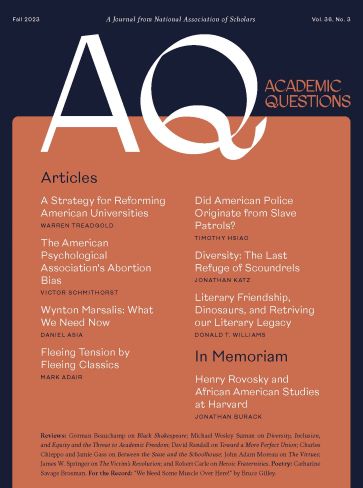The Virtues, John H. Garvey, Catholic University of America Press, 2022, pp.183, $24.95 hardbound.
John H. Garvey has written a remarkable book. It is remarkable because he gives us clear and engaging writing about a subject—the nature of moral qualities—that in the wrong hands could render even the most ardent reader to a state of numbness. Countless deep and thick writings are on offer if one is so inclined. From Garvey we receive a concise and pithy telling without a dumbing down.
For example, Garvey writes that prudence, the ability to govern and discipline oneself, is the most important of the Cardinal virtues. He says this is because, citing Joseph Pieper, prudence is the cause of other virtues being virtues at all. Virtues achieve their perfection only when they are founded on prudence, upon the perfected ability to make right decisions. It is the virtue that connects the reality of one’s situation to our choices. If the connection is strong the person is prudent. As Proverbs has it, "The discreet man considereth his steps," which in one modern translation is, "The prudent man looks where he is going."
Garvey gives us George Washington, whom many thought a fool for crossing the Delaware River. We see him as courageous. Morale was low and the Continental Army desperately needed a victory. Surprise was his best chance. Grave risk. But the attack on the Hessians aligned with the needs of the moment. “Washington,” says Garvey, “saw something others could not. His choice was courageous because it was prudent.”
This easygoing but not simplistic way of addressing prudence is the tone and style throughout the book. Garvey is a one-time practicing attorney and law school professor who was dean of the law school at Boston College and president of the Catholic University of America. He cites seventy-six works and fifty-two persons, pulling from Emily Dickinson more than any other. But his learning is worn lightly, each point made briefly and sensibly. He refers variously to a painting in Rome, another at the Art Institute of Chicago, a British writer named Zadie Smith and even a Pennsylvanian who spent years in the Gulag, Walter Cizek. Garvey quotes the Pennsylvanian’s memoir knowingly in a way that fits with Garvey’s discussion about personal peace, in the case of Cizek, heroic peace. The effect of Garvey’s selection of quotes and references makes the study of virtues more engaging, especially for the newcomer, than it otherwise would likely be.
It is striking that The Virtues is a book for anybody. Anybody who seeks to know what true happiness is, who wishes to define freedom, who understands the difficulty, at times, of making choices, who grants that choosing the good may not serve one’s interests, who knows one can bend to good or bend to evil. The book is useful for the person who has made a botch of things and for the person leading a strong moral life who wants reminders of what is truly worth doing, and for anybody between those poles.
Tone. Garvey reminds me of the kind of coach who week in and week out makes it plain the way the game is rightly played. Such a coach stresses less the how-to of things and more the why-to of things. The why-to regarding virtues is the likely rewarding result of acting in harmony with them. Part of the how-to for an athlete is strengthening of the muscles. Garvey says the mastering and keeping of the virtues is in essence like being a successful player. Take basketball. “At some point you built up and coordinated the right muscles. You began to feel what a good jump shot feels like. Eventually, taking a jump shot seemed natural. Moral habits are similar.”
The cardinal virtues are prudence, justice, courage, and temperance. They are, as one notable source puts it, the basis of a virtuous life. The virtues may also be seen as different aspects of a morally good character. The cardinal virtues, Garvey writes, "are meant to steer us towards happiness." Garvey also conveniently gives the reader the origin of the word cardinal, to wit: It comes from the Latin for hinges (cardines). A hinge opens a door and is thought to facilitate movement toward an important development.
The Theological virtues are faith, hope, and charity. In some cases we celebrate an act, such as the courage of Dietrich Bonhoeffer in returning to Germany. What makes Garvey’s effort so approachable is how he tells us so much of a virtue is related to the mundane. By way of example, I was left in no doubt about the virtue of his mother:
Everyone needs courage to live well. And not just in life’s big moments. We need courage in small and ordinary ones too. Mom didn’t start by being courageous the day my dad died, or the day she moved away from our family home forever. She practiced courage by getting out of bed each morning to build a home and to raise us as well. She learned fortitude in the ordinary challenges. When the time came to show us how to be courageous in the hard moments, it came naturally.
Much of The Virtues is aimed at and discusses youth, for in Garvey’s opinion “a critical piece of their education is missing. They aren’t learning how to live well.” Summarized, here is what Garvey wants the reader of whatever age to know or to think about:
- Bogus and sterile things are often mistaken for real happiness. The right to be able to do what we ought rather than what we like is what freedom is. “This kind of freedom,” he says, “takes goodness rather than choice as its reference point. . . . The virtues are habits that channel our freedom in the direction we ought to go. . . . Like muscles, moral habits become stronger the more we use them. But unlike muscles, moral habits become a part of who we are.”
- Living virtuously requires a special kind of courage. Reason alone cannot get us to either happiness or a good life. It is harrowing to find or to try to find “the courage to place ourselves on the side of good in seemingly hopeless situations.” So the hopeful person wants to recognize what he tethers himself to, what his anchor is, what preserves himself from selfishness. Often we choose among good things, so what is best, prudent under the circumstances? What I want is second to what is good. This is the crucial role of self-knowledge. One needs to ask whether he lives for himself alone. This is important because, as Garvey quotes Fulton Sheen saying, “our needs are limited but our wants are unlimited.” The bridle of restraint is right there in the open for he who wishes to be virtuous.
- One who seeks virtue knows that pleasures can become too powerful. So an ever present question is when to indulge and when to abstain. It is part of making “our lives bigger and our selves smaller.” It can take courage to put oneself on the side of good. Charity is the virtue that guides us in our common life. “Charity,” Garvey writes, “is a struggle; it is hard.”
What Garvey tells us about the Cardinal and Theological virtues is in clear and congenial English. A serious reader will not be left wondering what the author is talking about. Just as rewarding and a pleasant aspect of the book is The Little Virtues section. The Little Virtues follow sensibly upon Garvey’s mentioning the sometimes tyrannical and cruel effects of the internet, the plague of lonesomeness, the dearth of face-to-face relationships and the sterility of relationships built solely upon fingers flickering on a keyboard.
The Little Virtues are for all of us to embrace but especially the young who “have an eagerness to do something good with their lives.” Much of youth is spent in a fog of perplexity and so he who engages with the Little Virtues is likely to have one “Aha!” moment after another. Most of us seek to know how to live or to try to live. A young person reading about the Little Virtues may well say, “I didn’t know but now I do.”
Garvey, the former university president, states that the university today is a pond with a covering scum of “cynicism, suspicion, and skepticism.” Understood rightly the Little Virtues would not encourage anyone to be passive. Each is a shillelagh with which one raps the knuckles of the person one ought not to be. On Garvey’s list there are twenty-three Little Virtues. Examples:
- Modesty: this is the trait “that moderates our actions and desires in accordance with an honest estimation of ourselves.” Garvey very much dislikes end zone showoffs and admires the splendid running back Barry Sanders, who handed the ball to the referee after he scored and went back to work.
- Repentance: this has three effects: sorrow, confession, and satisfaction. “It’s the second part we struggle with,” says Garvey. “We don’t like to say we’re sorry.” To him the “sorry if” gambit is phony, not an apology at all. He adds that repentance “is the duct tape of family life.”
- Mercy: Garvey writes that mercy “is a tricky virtue. It is related to justice. But justice is easier to understand. . . . Mercy is a gift . . . It’s not something we can pay back.”
- Industriousness: it is on Ben Franklin’s list, to wit: “Lose no time. Be always employed in something useful. Cut off all unnecessary Actions.” Garvey says he puzzled about this one. It seemed to him “more, I don’t know, American” than the seven big ones. Ah, but then Garvey finds industriousness in the Proverbs.
- Docility: this works against the tendency to elevate ourselves. It means to be teachable, the habit of being open to learning from others.
- Silence: this is a kind of temperance. It is not about limiting the quantity of words but making sure what you say is useful.
- Meekness: this is related to serenity but it is not a mellow matter. It is the virtue that restrains anger and bestows self-possession. It quiets wrath and the urge to vengeance. Not long ago, Garvey says, one could exercise anger with an op-ed or a letter to the editor and by the time one got around to writing it he was less steamed than he had been or not angry at all. Now the checks on anger are gone. Now the internet has given us the sorry gift of being able to lash out immediately.
I set down The Virtues grateful for such a splendid rendering of what is gold, for its refined and pleasant way of saying that the worthwhile life is that which seeks by embracing the virtues to avoid the dark. I enjoyed this book because it is so richly sane and because Garvey so gracefully presents to us a tableau of thoughts and ideas ever wise, ever true.
John Adam Moreau, a history Ph.D. from the University of Virginia, Moreau has been a longtime reporter and editor for major daily newspapers; [email protected]. He is the author of Randolph Bourne, Legend and Reality (Public Affairs, 1966) and of published essays on such subjects as Huey Long, Francisco de Miranda, and Heywood Broun.














